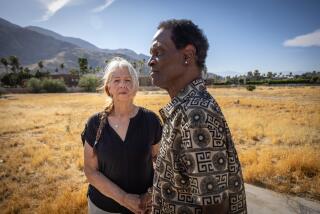County a Co-Star in Civil Rights Film
- Share via
With its tree-lined roads, quaint downtown and rustic charm, Ojai seems an unlikely setting to re-create the violent drama that unfolded in racially segregated Alabama nearly 50 years ago.
But local filmmakers Robert Hudson and Bobby Houston, whose documentary “Mighty Times: The Legacy of Rosa Parks” has been nominated for an Academy Award, knew their sleepy little town would provide the ideal backdrop.
They were also pleased that their project found a welcome reception in the county’s small black population. About 100 African American actors from a local casting company were recruited to appear in the film.
“The black community was ecstatic about the chance to take part,” said Hudson, who produced the film. “Unlike some in the South, they’d never been asked to participate in this sort of thing.”
The 40-minute documentary of the 1955 Montgomery, Ala., bus boycott that began with Parks’ single act of civil disobedience is an oral account of the birth of the civil rights movement. It’s the result of two years of research that took the filmmakers across the country and eventually back to Ojai.
In their modest studio, tucked away on a rural five-acre parcel, the filmmakers meticulously spliced together the sounds and images they had captured on their journey. When it was time to film key reenactments from the early days of the movement, they called a local casting director and found locations in Ojai and Santa Paula.
Grand Avenue, Reeves Road and Ojai Avenue in Ojai and downtown Santa Paula turned out to be ideal stand-ins for the Alabama of the early 1950s, Hudson said.
On Grand Avenue, they filmed the infamous bus scene, in which Parks refused to give up her seat to a white passenger.
And on a side street in Santa Paula, Hudson and Houston found the house they needed to replicate the night of Jan. 30, 1956, when agitators bombed Martin Luther King Jr.’s Montgomery home and the activist persuaded an angry mob not to retaliate with violence.
Vincent McCowan, casting director and owner of Prime Star Entertainment in Oxnard, played King.
“It was quite an honor to portray the role of a man who had so much influence in a peaceful way,” McCowan said. “For the actors involved, it was exciting to participate in a historical piece.”
The Montgomery-based Southern Poverty Law Center commissioned the $700,000 black-and-white film as part of its Teaching Tolerance program, which distributes informational videos and lesson guides to schools throughout the country.
Hudson and Houston had worked with the law center before, and although the center was pleased with their previous work, no one was sure if they could find a new way to recount such a familiar historical event.
“It is a story that’s been told so many times and they didn’t really think anyone could really make it exciting,” said Hudson. “They didn’t think they could be wowed.”
But they were, and so was the Academy of Motion Picture Arts and Sciences, which nominated the film last month for best documentary short.
“At first, I couldn’t believe it because I’ve been close before and I’m used to not getting my hopes up,” said Houston, a writer and director who left Hollywood’s bustle for Ojai’s small-town charm eight years ago. “Now, I’m a little giddy.”
Hudson and Houston met seven years ago in Houston’s fledgling Ojai bookstore and cafe, Local Hero.
Hudson, a former Los Angeles stockbroker, moved to Ojai to escape the city’s frenetic pace and was working on a project dealing with AIDS. He was putting together a crew to participate in the TransPac Yacht Race to Hawaii to illustrate that people with HIV and AIDS can lead active lives.
The two became friends, and Houston, along with his digital video camera, tagged along for the race. The ensuing film marked Houston’s entrance into documentary work and the beginning of the Ojai-based Tell the Truth Pictures.
By the time the law center commissioned the Parks documentary, Hudson and Houston were convinced they could find a new and creative way to retell the events that unfolded in Montgomery nearly half a century ago.
“We knew we could make a movie that kids would like,” Hudson said. “It’s one of the greatest underdog stories.”
They eschewed traditional history books and set off for Alabama, Mississippi, Louisiana, Illinois, Ohio, Georgia and Florida. They believed if they could find the boycott’s background actors -- the maids, cooks, drivers, barbers and teenagers who played a major role but are often ignored in historical texts -- a more complete story of Parks would emerge.
They knocked on doors, retrieving archival footage of the early marches, church meetings and fund-raisers while also collecting new details about the era.
“We quickly found out that the civil rights movement was different than the way history portrays it ... that Rosa Parks and Martin Luther King single-handedly carried the whole movement,” Houston said. “It’s actually the story of Rosa Parks and all of her friends and how they changed the world.”
Often portrayed as a simple seamstress tired from a long day’s work, the Parks of “Mighty Times” is a community activist who puts her personal safety on the line when the National Assn. for the Advancement of Colored People decides to test its stance against bus segregation.
The film, underscored by a powerful soundtrack of gospel and 1950s folk music, is largely narrated by descendants of the movement’s original activists. Parks’ young relatives also share the screen.
“We wanted to make a new generation of young people understand the courage and sacrifice and heroism of an earlier era,” said Richard Cohen, vice president of programs for the Southern Poverty Law Center.
The reenactments are integrated with archival footage that also mixes little-known facts or details that illuminate the involvement of Parks and others in the day-to-day struggle.
For instance, there was the time that Parks drove to Atlanta to collect used bicycles for the bus protesters.
There was the family that used its funeral home hearse to offer rides.
And there were the times that Parks would bring a broom and dustpan to help clean up supporters’ homes that had been bombed.
Everyone knows how the story ends. But that doesn’t make it any less compelling, the filmmakers said.
In November 1956, the Supreme Court ruled that segregation on city buses was unconstitutional.
“You already know [Parks] is going to triumph over evil, true evil,” Hudson said. “You couldn’t get a better story in Hollywood.”
More to Read
Only good movies
Get the Indie Focus newsletter, Mark Olsen's weekly guide to the world of cinema.
You may occasionally receive promotional content from the Los Angeles Times.










